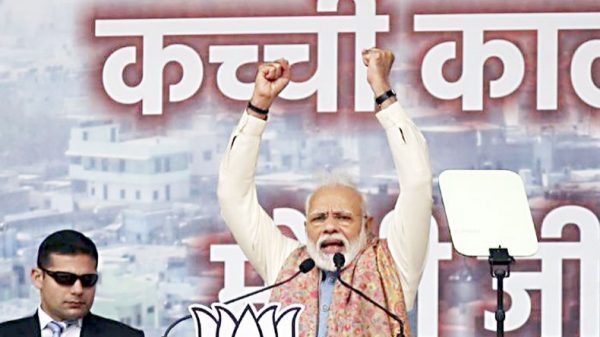Modi opponents labelled ‘anti-national’

- Update Time : Sunday, May 8, 2022
- 130 Time View

Aggressive propaganda is increasingly distorting public debate in India. Government agencies tolerate and sometimes even promote prime minister Narendra Modi’s Hindu chauvinism. Those daring to criticise the government face intimidation, harassment and suppression, writes Arfa Khanum Sherwani
IN DECEMBER 2021, leading Hindu supremacists met for a three-day conclave in the north Indian town of Haridwar. One demand raised was that Muslims in India be treated in the same way as Myanmar’s Rohingya minority. It was a blatant call to genocidal action. After all, the Rohingya were murdered in pogroms, villages were burned down and masses had to flee the country. The message spelt out in Haridwar was that Hindus should perpetrate bloodshed in order to entrench their lifestyle in India. Hate speech of this kind must be taken seriously, in view of India’s dark track record of pogroms.
It is illegal to stir communal hatred in India. Nonetheless, the authorities did not intervene even after the nature of what the extremists had discussed in Haridwar became known. As nationwide outrage at the news grew, the police finally arrested some participants, but it is unlikely they will be punished. Yati Narsinghanand, the mastermind of the meeting, was granted bail in February.
By contrast, non-violent government critics often languish in jail for years before a trial even starts. One current example is Umar Khalid, a prominent student activist who became a face of the protest movement against the anti-secular Citizenship Amendment Act in 2019–2020, in which Muslim women played leading roles.
Khalid has been detained since September 2020 and is accused of having instigated riots in Delhi. The charge is absurd because the ‘riots’ were actually an anti-Muslim pogrom. Dozens of people were killed; mosques were torched. Two-thirds of those who died were Muslims. After perpetrating acts of violence, Hindutva fanatics can mostly expect impunity, but state action against dissidents is usually very harsh. As with Khalid, the latter are often accused of violating India’s draconian anti-terror law, the Unlawful Activities Prevention Act.
Unconstitutional ideology
THE ideology of Hindu dominance is called Hindutva. Narendra Modi’s party, the Bharatiya Janata Party, belongs to a network of organisations that insists that India must be a Hindu nation. The organisation at the heart of this movement is the Rashtriya Swayamsevak Sangh, which was inspired by Italy’s fascists in the 1920s. International observers tend to underestimate the totalitarian aspirations of Hindutva proponents.
The RSS is mostly intolerant of any worldview other than its own. The RSS and its network equate ‘the nation’ with ‘Hindus’, yet mainly focus only on the upper castes. Minorities do not figure and are expected to simply accept the social order the RSS wants. Its approach to governance is at times undemocratic and at times authoritarian. The Hindutva right longs to gain total control of India’s institutions and resents being challenged, as it was by the farmers’ movement or the movement against the national citizenship law. BJP-controlled state agencies often respond with UAPA charges, accusing opponents of terrorism.
Hindutva ideology is fundamentally incompatible with India’s secular constitution, according to which no religious community may be oppressed or marginalised. Modi himself is a member of the RSS. He is known for his right-wing authoritarianism and his unwillingness to disown supporters who perpetrate violence.
To a large extent, mainstream media have caved in to his government. Commercial television stations in particular make a point of multiplying its aggressive propaganda. These channels do not have a reputation for fact-checking and generally accept everything the government says at face value.
Social media manipulation
AT THE same time, Hindutva trolls spread hate on social-media platforms. Anyone who dares to disagree with the Modi government is called ‘anti-national’, ‘treasonous’, or a ‘terrorist’. As the independent website The Wire, for which I work, recently revealed, the trolls use an app called Tek Fog to co-ordinate their action and to make disinformation go viral. To a considerable degree, Tek Fog manipulates digital media by technological means. The multinational corporations who own the platforms hardly intervene. They have shown on several occasions that pleasing the government is more important to them than promoting democratic discourse. Moreover, they do not really pay any attention to languages other than English.
The result is that Hindu supremacists appear more numerous and stronger online than they actually are in Indian society. In more ways than one, Facebook and Twitter have allowed themselves to become machines that spread hatred, misused to intimidate anyone who opposes the majoritarian agenda.
Targeted persons include social activists, human-rights defenders, members of opposition parties, lawyers and journalists. I myself have been exposed for a long time. Indeed, I am now on the list of the 10 Indian women who are most attacked on social media. Death and rape threats occur regularly.
Last year, the Hindu supremacists launched an app called Bulli Bai on which they staged fake auctions of Muslim women, using real photos and names. Due to public pressure, the app was taken down again, but it certainly served its purpose of harassing and intimidating the minority community.
Oppressed minorities
MINORITIES feel the impact in their daily lives. At the end of February, Muslim schoolgirls and students were barred from entering their educational institutions in the southern Indian state of Karnataka if they wore the Muslim headscarf. A court had passed an interim order permitting colleges to implement dress codes that were already in place. That order was misinterpreted, so all over the state, Muslim girls and young women were suddenly prevented from attending class. Karnataka’s chief minister Basavaraj Bommai belongs to Modi’s BJP.
Recently, Hindutva mobs have also regularly disrupted Friday prayers in Gurgaon, the Delhi suburb, which has officially been renamed Gurugram. The hooligans demanded that Muslims pray indoors, though everyone knows that the mosques are too small and too few to accommodate all the faithful on Fridays. At Christmas, Christian communities in southern India were attacked in a similar way.
Things are probably worst in Kashmir. The region was previously India’s only Muslim-majority state, but the Modi government dismantled its relative autonomy and put it under central rule in 2019. Repression is rife. In February, the arrest of Fahad Shah, the editor of the independent website The Kashmir Walla, made international headlines. The New York Times spoke of ‘harassment and intimidation’ while The Guardian stated that ‘a crackdown on the press in Indian-administered Kashmir continues to escalate’. Indian democracy needs more attention of this kind.
Qantara.de, April 29. Arfa Khanum Sherwani is managing editor of the independent online newspaper The Wire.



















